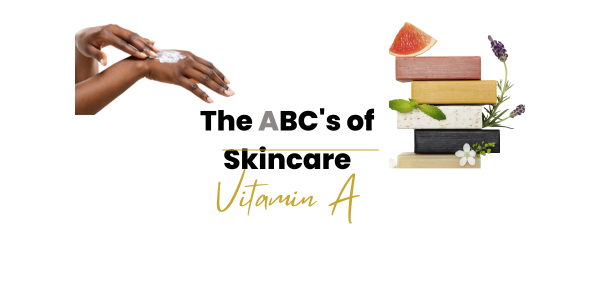 What are Vitamins?
What are Vitamins?
The letter “A” in ABCs will focus on Vitamin A benefits. This is a 3-part series focused on the ABCs of Skincare. This blog post will be the first topic in this series. If you have stumbled across another ABCs of skincare and it is not the first post, please go back and begin with “A.”
As many of you already know, vitamins are essential to life. They contribute to good health by regulating metabolism and assisting the biochemical processes that release energy when we digest food. They are considered micronutrients because our body needs them in relatively small amounts compared to macronutrients which are carbohydrates, fats, protein, and WATER.
What does Vitamin A do for the body?
As a Nutritionist, I learned that in addition to preventing night blindness and other eye problems, Vitamin A is also important in the formation of bones and teeth and protects against colds, flu, and infections of the kidneys, lungs, and mucous membranes. Vitamin A concurrently acts as an antioxidant, helping to protect the cells against cancer and other diseases. Now, I’m not going to bore you with details on what water-soluble or fat-soluble vitamins are, how many vitamins are fat-soluble or water-soluble, or anything like that because we are only focused on Vitamin A, which happens to be fat-soluble vitamin 🙂 You will learn that Vitamin A has many nicknames. See how many you can spot throughout this blog.
Your largest organ-The skin
As you can see, Vitamin A does a lot! Not only can it help us internally, but externally too! Your skin is THE LARGEST ORGAN your body has. It is responsible for eliminating a portion of the body’s toxic waste through sweating. This happens if the body contains more toxins than the kidneys, and the liver can get rid of the skin takes over. When toxins escape through the skin, unfortunately, the skin’s healthy integrity is disrupted, therefore leading to skin disorders, including acne.
Healthy skin should be free from visible signs of disease, infection, or injury. The skin should be slightly moist, soft, smooth, and flexible.
What can Vitamin A do for the skin?
Our friend, Vitamin A, helps to prevent some of those skin disorders. Internally, we consume it when we eat. In skincare, we use it topically on the skin as a serum or cream. Just in case you wanted to know foods to consume that have Vitamin A, I can share those with you. In the animal-based form, which is the “active” form, they are in liver and dairy/milk products. Some plant-based sources are sweet potatoes, carrots, spinach, and other fruits and veggies that are red, orange, or even dark green in color. Fun Fact-beta-carotene is responsible for giving carrots and sweet potatoes their orange color!
Since we are referring only to “skincare” on this blog, I will share with you some skin-loving benefits of Vitamin A.
- Improves the appearance of wrinkles and sagging and reduces fine lines-Evidence shows that using topical retinoids (Vitamin A) reduces the appearance of fine lines and wrinkles by stimulating collagen production.
- Reducing hyperpigmentation and sun damage- Eating a diet high in carotenoids (Vitamin A) protects your skin from environmental factors like pollution and UV radiation. See, retinoids promote skin cell turnover. This helps to improve hyperpigmentation, age spots, and sunspots which leads to a more even skin tone overall.
- The number one culprit of them all-Acne. The American Academy of Dermatology (AAD) states that retinoids can help exfoliate the skin on the surface, removing dirt, oil, and dead skin cells from pores to prevent pimples. It can also penetrate the skin to stimulate collagen, which reduces the appearance of pores and acne scarring.





